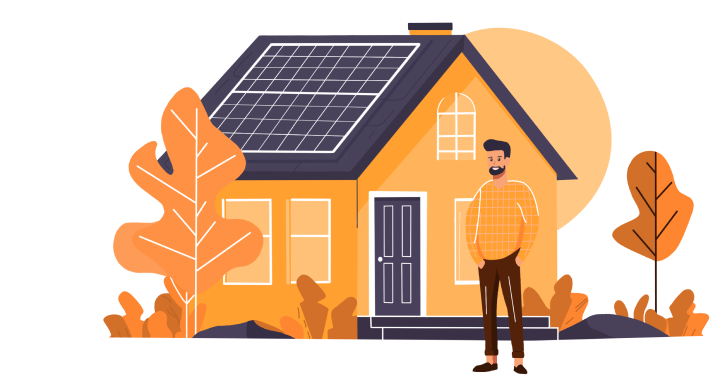What expenses make up the typical solar panel installation cost? Whether you're considering solar financing or are deciding on which provider to book a solar consultation with, understanding the initial financial obligations of installing solar is important so you don't go over budget.
With Solar Energy Host, you can find a solar provider who meets your household's needs while staying cost-effective. But first, here are a few tips to save cash on your installation:
Step #1: Explore financing and incentives
Tax credits
Solar panel installation does not have to cost an arm and a leg, especially with the initiatives set forth by the government and other groups. Federal tax credits may allow eligible homeowners to deduct a significant portion of the solar system cost from federal taxes.
State and local incentives
Beyond federal benefits, many state and local governments provide additional incentives to encourage solar adoption, all of which could significantly lower your typical solar panel installation cost.
Aside from tax credits, there could be rebates or performance-based incentives available. Check your state's or county's specific programs to see what's available. Additionally, many utility companies have incentives for customers who switch to solar, including cash rebates or bill credits.
Solar loans
Financing options like solar loans could also bring down the typical solar panel installation cost by spreading it out over time. Solar loans allow you to borrow the money needed for installation and pay it back in installments. Some solar companies may even offer in-house financing to help reduce the residential solar cost for homeowners looking to go green.
Step #2: Identify factors influencing cost
System size and installation complexity
How much does it cost to install solar panels? The size and capacity of your solar panel system are primary factors in determining the typical solar panel installation cost. Since they require more panels, larger systems generally come with higher upfront costs but could offer more significant long-term benefits in terms of energy production and savings.
For instance, a 5 kW system will cost more initially compared to a 3 kW system but will generate more in terms of solar panel energy output, which may reduce your utility bills substantially over time.
Roof characteristics, such as slope, orientation and condition, can affect installation costs. If your roof requires structural modifications or repairs to support the panels, expect additional expenses.
Accessibility issues, like multi-story homes or obstacles around the installation area, can further increase labor costs. Custom designs to maximize sunlight exposure might also add to the solar panel installation cost.
Panel type and quality
The type and quality of the solar panels you choose will significantly influence the overall cost of installing solar panels. They come in various types, such as monocrystalline, polycrystalline and thin-film panels, each with different solar panel efficiency rates and price points.
Monocrystalline panels may be more expensive due to their higher efficiency and longer lifespan. They also tend to perform better in low-light conditions. Polycrystalline panels, while slightly less efficient, are more affordable and still provide good performance for most homeowners.
Thin-film panels, though cheaper, are not as efficient and may require more space to generate the same amount of energy as crystalline panels.
Installation complexity
A solar panel installation service can vary in complexity, affecting your typical solar panel installation cost. For example, if your installation involves multiple roof angles, requires specialized mounting hardware or includes additional components like battery storage systems, the costs can increase.
A shading analysis may need to be done to ensure optimal placement. Ground-mounted panels may need trenching. Finally, integrating the system with existing electrical infrastructure can also add to the complexity and expense. Your solar installer should be doing a careful evaluation to provide an accurate estimate tailored to your specific situation.
Step #3: Find a reputable and cost-effective installer
Balancing quality with budget limitations
Of course, finding the right balance between a professional who can install a solar panel setup and staying within your budget is crucial. However, a reputable installer ensures a safe and efficient installation, which is very important as solar power systems are integrated into your home's electrical infrastructure.
While it may affect the typical solar panel installation cost, quality workmanship leads to greater energy savings and system longevity, providing a better return on investment over time. Reliable installers also know how to install solar panels that can withstand harsh weather conditions and last longer, reducing maintenance costs.
Finding competitive quotes through Solar Energy Host
First-time homeowners often find the process of selecting a solar provider overwhelming. This is where we at Solar Energy Host can step in. Our platform connects you with multiple reputable solar installers, providing competitive quotes to help you learn about the typical solar panel installation cost in your area before you make an informed decision.
Knowing which companies offer the best deals isn't always easy. With our platform, you gain access to actual quotes, ensuring you find an installer that fits both your quality standards and budget.
Frequently Asked Questions (FAQ)
How much energy can solar panels produce?
The amount of energy that solar panels can produce depends on several factors, including the size of the system, panel efficiency and sunlight availability. Typically, a 400-watt solar panel can generate around 1.8 kilowatt-hours (kWh) of electricity per day under ideal conditions. However, actual output can vary due to real-world factors such as weather, temperature and shading.
What maintenance do solar panels require?
Solar panels are relatively low-maintenance, but a few routine tasks are essential so they operate at peak efficiency. One example of a solar maintenance task is cleaning the panels to remove dirt, debris or snow to maintain optimal performance.
A maintenance professional will also inspect the panels for damage, such as cracks or loose connections. Additionally, they may recommend trimming any trees or vegetation that might grow and cast shadows on the panels to help sustain their efficiency. Finally, they may periodically check the inverter and other system components to ensure everything functions correctly.
What happens if my solar panels produce more energy than I use?
When your solar panels generate more electricity than your home consumes, the excess energy is sent back to the utility grid. Many areas offer net metering programs, allowing homeowners to receive credits or payments for this surplus generation.
Net metering lets you offset your electricity bill with the credits earned from the extra solar energy you produce. Some utility companies might even purchase the surplus electricity at a predetermined rate. However, net metering policies can vary by state and utility, so check with your local provider to understand the specific rules and compensation rates in your area.
Going green and saving money with Solar Energy Host
At Solar Energy Host, we illuminate the path to solar savings, making it easier for homeowners to switch to clean, renewable energy. Our mission is to connect you with top local solar providers, delivering competitive quotes directly to you so you can find the best deal for your home.
Our free cost estimate tool provides quick insights into potential savings on your electricity bills. Enter basic information about your home to receive quotes from multiple providers in your area. We work with a range of trusted providers to find the best deals for you. Whether you're looking for the lowest price or the best return on investment, we've got you covered.
At Solar Energy Host, we're your partner in creating a sustainable future. Start saving with solar today and enjoy the numerous benefits it brings to your home and the environment.














